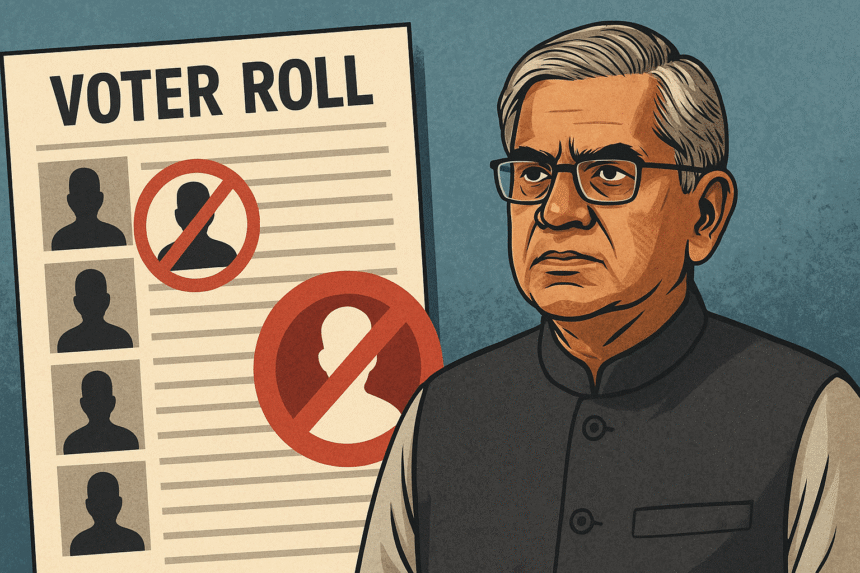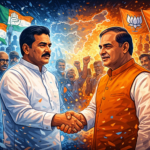Imagine showing up to vote and finding out that your long-deceased great uncle is still listed—alive, voting, and possibly even choosing your representative. Sounds like a ghostly political thriller, right? Welcome to the peculiar realities of India’s outdated voter roll, where ‘dead’ votes and ‘foreign’ names have stirred up a storm, especially in Bihar.
But things are changing—and fast. The Election Commission of India (ECI) has put its foot down, and Chief Election Commissioner Gyanesh Kumar is leading the charge like a bureaucratic ghostbuster.
Let’s unravel the political drama, the public response, and what it means for our democracy.
🛑 The Big Cleanup: A Special Intensive Revision (SIR)
India loves acronyms. This time, it’s SIR—Special Intensive Revision, not the respectful title your school principal insisted on.
This exercise aims to scrub Bihar’s electoral roll squeaky clean. The goal? Weed out deceased individuals, fake entries, and those who’ve shifted permanently but still haunt voter lists. And trust us, we’re not talking about just a handful.
According to the ECI, over 21.6 lakh voters are dead. Yes, dead. Another 31.5 lakh have permanently migrated. Add more than 7 lakh ‘untraceables’, and you’re looking at a political horror movie.
Now imagine these votes swinging elections. Goosebumps? Good. Because that’s why the ECI is acting swiftly.
🧠 The Logic Behind the Purge
Critics, of course, are fuming. Allegations of political vendetta, voter suppression, and bureaucratic tyranny have been hurled like cricket balls in a street match.
But the Chief Election Commissioner isn’t mincing words. “Should we allow dead voters to vote? Or foreigners?” he asks.
Good point, sir.
His stand is simple yet strong—if we truly want a fair election and a strong democracy, we need a clean voter roll. No fake names. No duplicate entries. And certainly no dearly departed casting phantom ballots.
That’s not voter disenfranchisement. That’s democracy hygiene.
🤔 Politics vs Constitution
CEC Gyanesh Kumar made it clear—allowing ineligible people to vote, whether in Bihar or across India, is a violation of the Constitution.
And honestly, he’s not wrong. The right to vote is sacred. Letting someone misuse that right dilutes the very fabric of democracy. And if that someone doesn’t exist anymore? That’s a straight-up ghost vote.
He even urged critics to rise above “ideologies” and address fundamental questions of electoral integrity. And while that sounds like a TED Talk, it’s what India might genuinely need right now.
🕵️♂️ The Numbers Game: 1 Crore+ Voter Questions
Let’s talk digits. Bihar’s electoral roll is facing a potential revamp of over 1 crore entries. That’s not just a typo—it’s nearly the population of an entire state in Europe.
The Booth Level Officers (BLOs) have been on-ground warriors, knocking doors, verifying addresses, and trying to track ghosts who never answer the doorbell.
Yet, there’s noise from opposition benches and civil society, accusing the ECI of rushing the process. The worry? Genuine voters may be cut off, disenfranchised, or burdened with long-winded bureaucratic appeals.
Valid concern. But as the ECI clarified, any aggrieved person can approach the BLO or Election Office till September 1to fix any wrongful exclusions. It’s not perfect, but it’s a door still open.
🎭 The Political Theatre
Let’s not pretend this isn’t political. Every cleanup—whether it’s your garage or a voter list—comes with resistance. Especially if your opponent believes your mop is biased.
Parliamentarians have raised eyebrows. Opposition leaders are crying foul. Accusations are flying thicker than Delhi’s monsoon mosquitoes.
But what’s fascinating is how the ECI is holding its ground. “We won’t be intimidated,” Kumar asserted. A rare moment of defiance in India’s complex political chessboard.
In an era where most institutions are accused of leaning one way or the other, this stand-alone act of electoral cleansing deserves applause—if done fairly and transparently.
🗓️ What Happens Next?
- July 25: Final submission date for enumeration forms.
- August 1: Draft voter roll to be published.
- September 1: Last date to make corrections if your name was unfairly dropped.
- Next Election Cycle: We’ll see how effective this exercise really was.
What’s refreshing is that the ECI has invited feedback, promised redressal, and opened channels for genuine grievances. That, folks, is called “accountability”—a word rarely used in Indian bureaucracy.
🌍 Why This Matters Beyond Bihar
Bihar may be the testing ground, but the implications are national. If this clean-up works, expect similar moves across India. And that’s a good thing.
Because let’s be real—every Indian knows someone whose name still shows up in the voting list years after they’ve passed. And every election brings stories of double entries, fake voters, and missing names.
The credibility of our electoral roll is the foundation of our democracy. If we can’t trust that, can we trust the results?
💡 Final Thoughts: Clean Rolls, Clear Conscience
So here’s the truth.
No one wants their vote diluted by a fake or dead entry. And while no cleanup will ever be perfect, doing nothing is worse.
The ECI’s Bihar purge is a bold step in the right direction. It’s not about politics. It’s about principles. And sometimes, principles need to be defended—even if it means confronting ghosts.
Let’s hope other states take the cue. Let’s hope political parties stop using dead voters as pawns. And let’s hope we, the citizens, support the idea of fair, fraud-free elections.
Because a clean voter roll isn’t just about names. It’s about trust. And trust, once broken, takes more than a revision list to rebuild.












